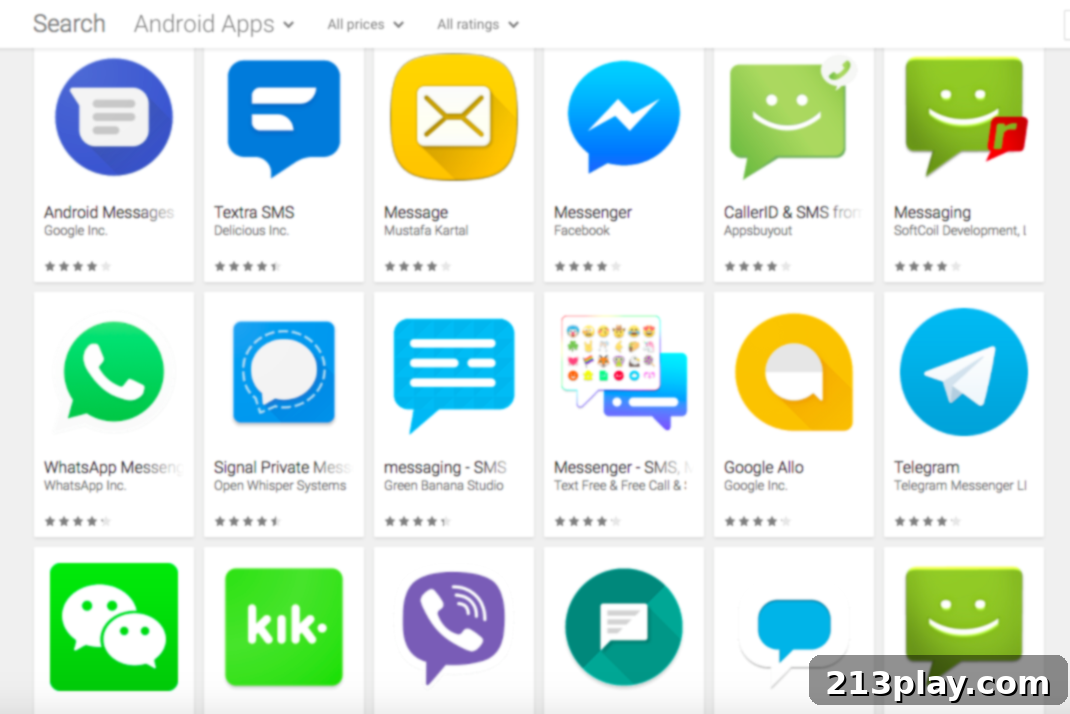Beyond WhatsApp: Exploring the Best Secure Messaging Apps for Enhanced Privacy and Communication
Table of Contents
Understanding the Shift: Why Seek WhatsApp Alternatives?
In recent years, the digital landscape for communication has undergone significant changes, particularly concerning user privacy. A major catalyst for this shift was WhatsApp’s controversial privacy policy update, which sparked widespread concern among its billions of users globally. This update, which essentially mandated data sharing with its parent company, Facebook (now Meta), ignited a vigorous debate about digital autonomy and personal information.
The core of the controversy revolved around how WhatsApp intended to leverage user data. The updated policy made it clear that user information, including metadata about interactions and transactions (though not message content due to end-to-end encryption), could be shared across Facebook’s ecosystem. This data could then be used for more targeted advertising and potentially shared with other third-party entities. For many users, this represented an unacceptable erosion of their privacy, transforming their personal communication habits into a commodity for corporate profit.
As a result, millions of individuals began actively seeking alternatives to WhatsApp – applications that promised a higher degree of privacy, better security, or simply a different approach to handling user data. The demand for secure messaging apps that prioritize user anonymity and robust encryption grew exponentially. Today, we delve into the five best messaging applications that stand out as excellent alternatives to WhatsApp, examining their features, security protocols, and overall user experience. Our aim is to help you make an informed decision about which platform best suits your communication needs while safeguarding your digital privacy.
Skype: The Pioneer’s Enduring Presence

Skype stands as one of the original trailblazers in the realm of online voice and video communication. Launched in 2003, it revolutionized how people connected across distances, evolving from a simple VoIP service into a comprehensive communication platform. Today, Skype offers a wide array of features including free video calls, audio calls, instant messaging, group chats, and file sharing. Its cross-platform compatibility is a significant advantage, allowing users to connect seamlessly whether they are on Windows, Mac, Chromebook, iOS, Android, or even through a web browser.
Skype’s core functionalities mirror many of WhatsApp’s offerings. Users can create groups, share images, videos, documents, and even share their screen, making it a versatile tool for both personal and professional interactions. For a fee, Skype also enables calls to landlines and mobile phones worldwide, a feature that distinguishes it from many pure internet-based messaging apps.
However, when considering Skype as an alternative to WhatsApp, particularly concerning privacy, there are crucial distinctions. While WhatsApp is owned by Meta (Facebook), Skype is a product of Microsoft. Unlike WhatsApp, which provides end-to-end encryption by default for all personal messages and calls, Skype conversations are not universally end-to-end encrypted. Microsoft uses its own encryption for calls and messages, but it retains the ability to access user data if legally required, especially for internal purposes like improving service quality or targeted advertising, albeit less controversially than Facebook. The perception is that Microsoft, despite being a tech giant, is generally viewed as less aggressive in its data monetization practices compared to Meta, which might make Skype a more palatable option for some privacy-conscious users who are looking for a reliable communication tool with a robust feature set.
Telegram: Feature-Rich and Privacy-Optional

Telegram has surged in popularity, particularly following WhatsApp’s privacy policy controversy, crossing a significant milestone of 500 million monthly active users. Often perceived as a direct competitor or a more privacy-focused clone of WhatsApp, Telegram offers a vast array of features that often surpass its rival. Users can engage in standard messaging, voice and video calls, and group chats, but Telegram takes it a step further with its unique “channels” for broadcasting messages to an unlimited audience and “supergroups” that can host up to 200,000 members.
One of Telegram’s most celebrated features is its generous file-sharing limit, allowing users to send files up to 2 GB, a stark contrast to WhatsApp’s 16 MB limit. This makes it an ideal platform for sharing large documents, videos, or other media. Telegram also boasts a robust ecosystem of bots, offering everything from games and quizzes to news feeds and utility tools, enriching the user experience significantly. Self-destructing messages, message editing, and custom themes are other popular additions.
Regarding security and privacy, Telegram presents a nuanced picture. While many users believe Telegram is inherently secure and that “nobody can read your messages,” it’s crucial to understand its encryption model. By default, Telegram uses client-server encryption for its regular cloud chats, meaning messages are encrypted when transmitted to Telegram’s servers and then decrypted for delivery to the recipient. These chats are synchronized across all your devices, allowing for easy access to your message history. However, Telegram also offers “Secret Chats,” which are end-to-end encrypted. In a secret chat, messages are encrypted on the sender’s device and can only be decrypted on the recipient’s device, ensuring that even Telegram itself cannot access the content. These secret chats are device-specific and do not sync across multiple devices. This distinction means that while Telegram offers strong privacy options, users must explicitly choose to use Secret Chats for true end-to-end encryption, unlike Signal or WhatsApp where it’s the default for personal communications. Telegram’s custom MTProto encryption protocol has also been a point of academic debate, though it has not been definitively broken.
Line: Asia’s Multifaceted Communication Hub

Line is a powerhouse messaging application, particularly dominant across several Asian markets, including Japan, Taiwan, Thailand, and Indonesia. While it may not enjoy the same widespread popularity in Western countries as WhatsApp or Telegram, Line offers a unique and engaging communication experience that makes it a compelling alternative. Beyond standard text messages, voice calls, and video calls, Line is renowned for its extensive and vibrant sticker store, allowing users to express themselves with an unparalleled range of animated and often humorous characters. These stickers have become a cultural phenomenon in regions where Line is prevalent.
Line distinguishes itself with a tabs-based interface that integrates various services beyond just messaging. Users can access a news feed (Line Today), play games, follow official accounts of brands and celebrities, and even utilize mobile payment services like Line Pay. This integration transforms Line into more of a “lifestyle platform” rather than just a communication app, offering a comprehensive digital ecosystem within a single application. The convenience of having payment, news, and entertainment bundled with messaging is a significant draw for its user base.
However, this multifaceted approach comes with privacy considerations. To deliver personalized news, targeted coupon codes from popular brands, and facilitate its diverse services, Line necessarily collects a significant amount of user data. While Line does implement end-to-end encryption (often referred to as Letter Sealing) for its messaging feature, the broader ecosystem of services means that user activity across the app’s various tabs contributes to a user profile that can be leveraged for advertising and content curation. For users who prioritize an all-in-one app experience and enjoy expressive communication tools, Line offers a fun and functional alternative. But for those strictly seeking minimalist communication with zero data footprint, its extensive feature set might be a drawback due to the inherent data collection required to power such a broad ecosystem.
WeChat: China’s Omnipresent “Super App”

WeChat, developed by Tencent, is nothing short of an institutional force in China, often referred to as a “super app” due to its unparalleled integration into virtually every aspect of daily life. Far beyond a simple messaging application, WeChat allows users to perform an extraordinary range of functions: chatting with friends, making voice and video calls, sharing moments like on social media, booking taxis, ordering food, transferring funds (WeChat Pay), scheduling appointments, reading news, playing games, and even accessing government services. Its ubiquity means that for many in China, WeChat is the internet.
The app’s comprehensive functionality has led to a highly robust and integrated user experience within China. Developers have indeed invested heavily in making the app reliable and secure for its diverse set of services, claiming end-to-end encryption for messaging. However, it’s crucial to differentiate between the WeChat experience within China and its international version. Outside of China, a more toned-down version of WeChat is available, primarily focusing on messaging, voice/video calls, and some payment functionalities, though its full “super app” capabilities are largely reserved for its primary market.
Despite claims of end-to-end encryption, WeChat faces significant privacy and censorship concerns, especially for users outside of China. Due to its origin and operation within China, the app is subject to Chinese government surveillance and censorship laws. This means that data, even if encrypted in transit, may be accessible by authorities, and content can be filtered or blocked. This casts a considerable shadow on its privacy assurances compared to Western standards. For casual users communicating with contacts primarily in China, WeChat remains an essential tool. However, for anyone prioritizing robust privacy and freedom from government oversight in their communications, especially those dealing with sensitive information, WeChat might not be the most suitable alternative to WhatsApp, despite its impressive feature set.
Signal: The Gold Standard for End-to-End_Encryption

Signal is widely regarded as the pinnacle of secure and private messaging, often recommended by cybersecurity experts, privacy advocates, and even prominent figures like Elon Musk and Edward Snowden. Its reputation as the “gold standard” stems from its unwavering commitment to user privacy, which is the app’s sole focus. Signal is developed by the Signal Foundation, a non-profit organization, ensuring its mission is driven by privacy, not profit.
The most significant differentiator for Signal is its default, robust end-to-end encryption for all communications. Every message, voice call, video call, and file shared on Signal is encrypted from sender to recipient, meaning only the communicating parties can read or hear the content. Not even Signal’s servers can access your conversations. This is powered by the open-source Signal Protocol, which is widely recognized by cryptographers as one of the strongest and most secure encryption protocols available. It’s so secure, in fact, that other popular messaging apps, including WhatsApp, have adopted versions of the Signal Protocol for their own encryption (though with varying implementations and additional data collection policies).
Signal’s open-source nature means that its code is publicly available for scrutiny by security researchers worldwide, allowing for transparency and independent verification of its security claims. This contrasts sharply with proprietary applications where the underlying code is hidden. Signal also practices minimal data collection; it stores almost no metadata about its users beyond the last time they connected to the service. It doesn’t track who you’re talking to, when, or from where.
The app offers all the essential features you’d expect from a modern messaging app: one-on-one and group chats, voice and video calls, file sharing, disappearing messages, and even screen security to prevent screenshots of your conversations. Its endorsement by Brian Acton, a co-founder of WhatsApp who left Facebook due to disagreements over privacy and data monetization, further solidifies its credibility. Acton went on to co-found the Signal Foundation, dedicating his efforts to a truly privacy-first messaging platform. For anyone whose primary concern is impenetrable privacy and security for their digital communications, Signal is, without question, the most recommended and trustworthy alternative to WhatsApp.
Choosing Your Digital Sanctuary: Final Thoughts
The digital world offers a plethora of communication tools, and while WhatsApp has long dominated the landscape, the growing awareness around data privacy has propelled many users to explore alternative messaging applications. As we’ve seen, each of the reviewed platforms—Skype, Telegram, Line, WeChat, and Signal—brings its own unique strengths and considerations to the table, making them viable contenders depending on individual needs and priorities.
Skype remains a venerable choice for its reliable video and audio calling, particularly for those integrated into the Microsoft ecosystem or needing to connect with landlines. However, its default lack of end-to-end encryption for all chats makes it less ideal for the most sensitive communications. Telegram shines with its rich feature set, massive group capabilities, and impressive file sharing, appealing to users who want more than just messaging. Its “Secret Chats” offer robust end-to-end encryption, but the user must actively opt into them, a crucial detail often overlooked.
Line provides a vibrant, all-encompassing lifestyle app, particularly popular in Asia, blending communication with payments, news, and entertainment. While it offers end-to-end encryption for messages, its extensive data collection across its vast ecosystem is a trade-off for convenience. WeChat, as China’s unparalleled “super app,” demonstrates the extreme end of digital integration. While it’s indispensable for communicating within China, significant privacy and censorship concerns, particularly for international users, mean it should be approached with caution for sensitive conversations.
Finally, Signal stands out as the undisputed leader for privacy and security. Its default end-to-end encryption, open-source transparency, and minimal data collection policy, coupled with endorsements from leading privacy advocates, make it the top recommendation for anyone prioritizing the integrity and confidentiality of their communications. It’s a testament to the fact that genuinely private communication is possible without compromising on essential messaging features.
Ultimately, the choice of your digital communication platform hinges on your personal priorities. If absolute privacy and security are paramount, Signal is your best bet. If you seek advanced features, large community management, and are comfortable with optional encryption, Telegram is a strong contender. For those in Asia looking for an integrated lifestyle app, Line offers unique benefits. When evaluating any “free” third-party application, it’s essential to remember the adage: “If you’re not paying for the product, you are the product.” Understanding how these apps handle your data, their encryption methods, and their underlying business models is key to making an informed decision about your digital sanctuary. By choosing wisely, you can regain control over your privacy and communicate with confidence in an increasingly interconnected world.
